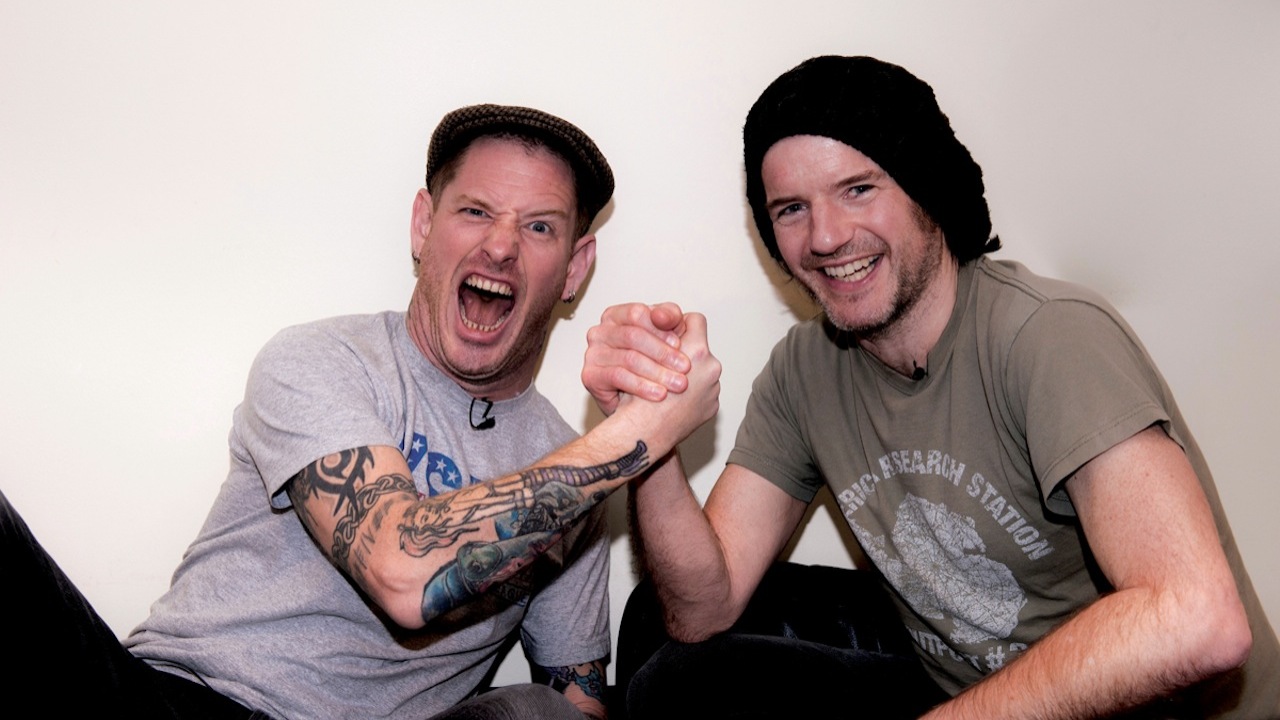Corey Taylor’s fascination with comics is well-documented. Spend any amount of time talking to the frontman and the subject of comic books and graphic novels will almost inevitably enter the conversation.accompany. He even put his money wheere his mouth was and wrote his own comic to accompany Stone Sour’s two-part House Of Gold And Bones endeavour.
Charlie Adlard is just as obsessed with music. The Shrewsbury-born comic book artist is famous for his work on 2000AD, Savage and, most notably, The Walking Dead, but he also plays drums with stoner/space rock crew Cosmic Rays.
Back in 2015, we asked the members of Slipknot to guest edit an issue of Metal Hammer. As part of this, they got Charlie to draw an exclusive cover for the magazine featuring the band. And when Slipknot hit Wembley Arena as part of their UK tour in support of .5: The Gray Chapter album, we decided to get these two icons together backstage to talk comic books, music and all-round mutual admiration.
This is how it all went down…

Corey: “It’s pretty fucking cool to hang with you right now! I told my friends, ‘You won’t believe who I’m gonna hang with…’ and they were like, ‘No fucking way!’ Ha ha ha! I’m such a huge fuckin’ Walking Dead fanboy…”
Charlie: “It’s great to meet you too! Have you always been a comics nerd?”
Corey: “Oh yeah, man. I grew up a Marvel kid, y’know?”
Charlie: “Yup, so did I! Marvel had the wherewithal back in the 70s to actually produce stuff for the UK market, so you couldn’t get the monthlies, or you could but they were really sporadic, so as soon as Marvel introduced black and white anthology comics, which is what worked in the UK, that’s what I grew up on.”
Corey: “When I was a kid, we moved around a lot as a family. My mom had this ratty stack of comics, and I basically learned how to read by reading comics. That’s what got me into it and I have been into it ever since. I became a huge collector. I’ve still got a bunch of stuff from when I was younger. I’m really into action figures now, too. I started collecting the Walking Dead stuff as soon as it came out, so I’ve got not only the direct editions but all the trades too. Me and my friends were huge fans [of the comic book].
Probably the first six years… before I went on the road. I’ve got all the original copies of everything. The story, the artwork… everything about that comic is great. To me, it’s not about the flash and how far you can take the artwork, it’s about how the story and the artwork lends itself to the story. It’s such a human story. You can’t help but be drawn into it, through the writing. That’s what I love about it.”
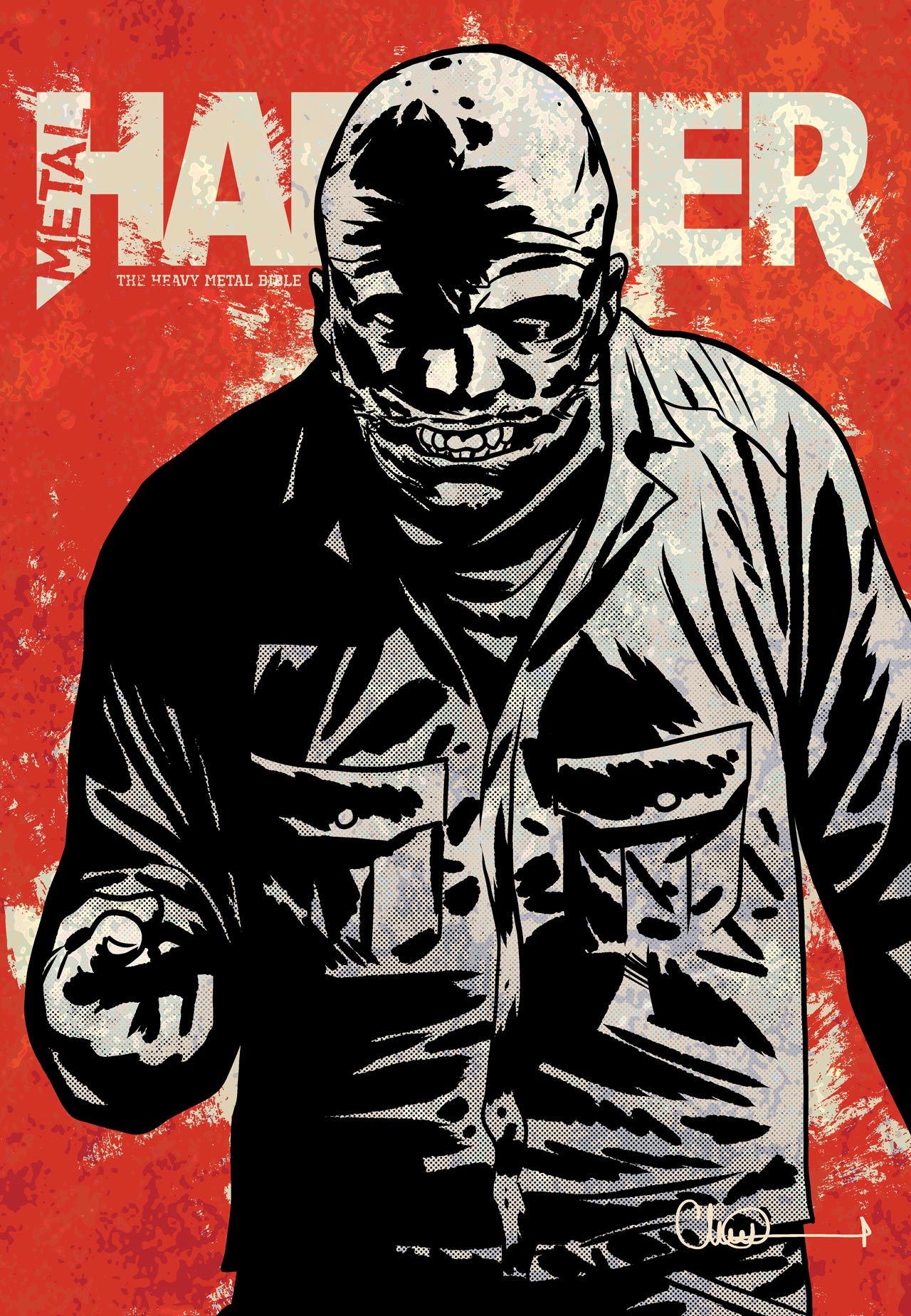
Charlie: “Yeah, that’s what originally attracted me to it. It’s a weird thing, because when Robert [Kirkman, author of The Walking Dead] sent me the first script, I just knew I had to draw it. I knew Robert from before and he just emailed me out of the blue and said, ‘Do you fancy drawing this comic? Have you heard of The Walking Dead?’ I was like ‘No…’ Ha ha!
“At the time, there was a small comic shop near where I live, but it just sold the obvious, commercial stuff, so I wasn’t familiar with it. Robert sent me the first script and it was good. He just happened to call me between jobs, so I started drawing it and just kept going. The Walking Dead is a slow burner, I find. It took even me about four or five issues to realise that it was really good. It’s like what people say about Jaws… it’s not a film about a shark…”
Corey: “Exactly! It’s about the people, right?”
Charlie: “Yeah, it’s not really about zombies. Or not just about zombies.”
Corey: “Yeah, the zombies are in the background. It’s part of the story but it’s not the central prop.”
Charlie: “Exactly. I wouldn’t have been drawing it for 30-plus issues if it was just about the zombie apocalypse. It wouldn’t have lasted.”
Corey: “That’s why quality stuff sticks around as long as it does. A comic like The Walking Dead has that longevity because there are so many embedded things going on. It’s such a human story, where there’s this threat out there but you still have to worry about humans… they’ll fuckin’ turn on you and fuck you over!”
Charlie: “Yeah, it’s the old cliché… in the end, it’s not the zombies that are gonna get you…”
Corey: “You’re gonna eat each other! Ha ha!”
Charlie: “If it was just the zombies you had to fight, it would be easy!”
Corey: “That’s right. Kill ’em all and then get back to your Kumbaya circle!”
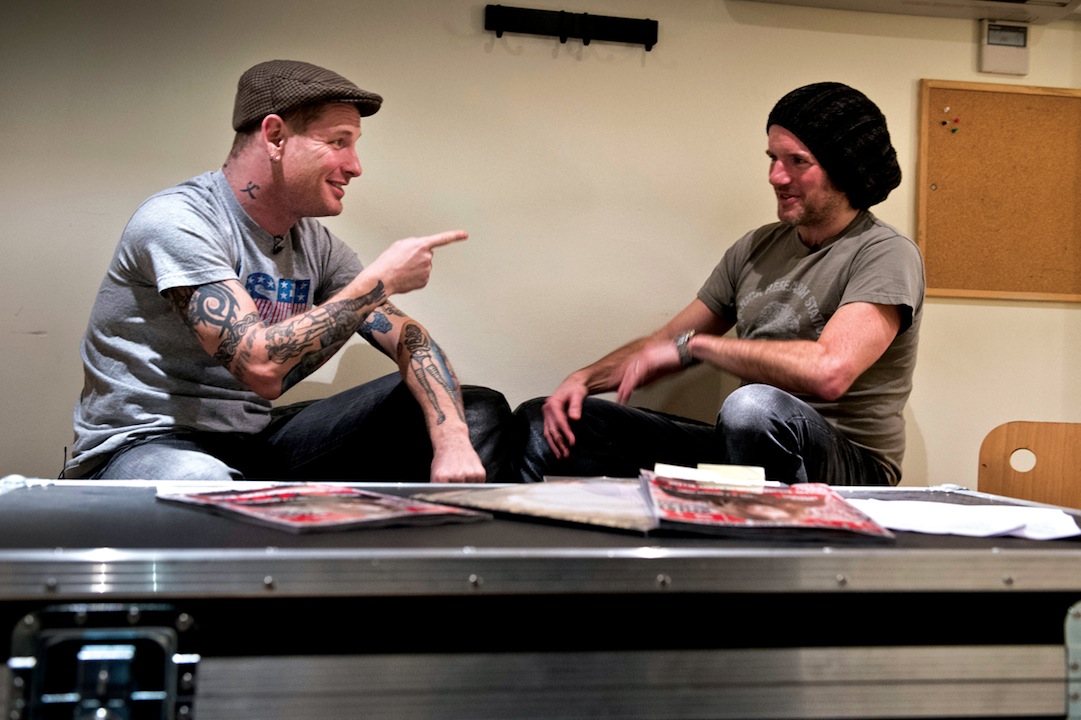
The parallels between Corey’s success with Slipknot and Charlie’s success with The Walking Dead may not be entirely obvious at first, but there’s an immediate sense of kinship between these two maverick figures that tells its own story. Both have seemingly burst into the mainstream and exerted a strong grip on the cultural zeitgeist, despite producing art that initially presented a sturdy challenge to mainstream tastes. Both have gone on to become internationally renowned as a result of their groundbreaking efforts and idiosyncratic visions and, as they now discuss, both have had their lives changed forever as a result.
Corey: “When the Walking Dead TV show really took off, how did that make you feel? When it really became a part of the zeitgeist… what was that like?”
Charlie: “I could almost ask you the same thing. For me, it was a gradual process.”
Corey: “It could seem like an overnight sensation, but I guess it’s not…”
Charlie: “The comic, literally every issue has sold more and more, so it’s been gradual. You don’t go to San Diego Comic Con, speak with a producer and then four months later it’s a TV show. The whole process actually took about two years before it reached the screen. At one point we were so close, and I remember Robert saying, ‘This is it! We’re gonna be a TV show!’ but then the whole thing collapsed.
“I wasn’t really upset because we were doing alright as a comic and I was making a decent living, so it was like, ‘Ah well, I’m happy doing what I do…’ But then the process started again, growing by gradual increments, and suddenly it’s happening and it’s a phenomenon. But I live in a small town in the UK countryside with 50 or 60,000 people. I live in leafy suburbia with my family and I’m a million miles away from Hollywood. Robert lives that, because he’s in Hollywood, but I’m in Shrewsbury and I don’t see any of that.”
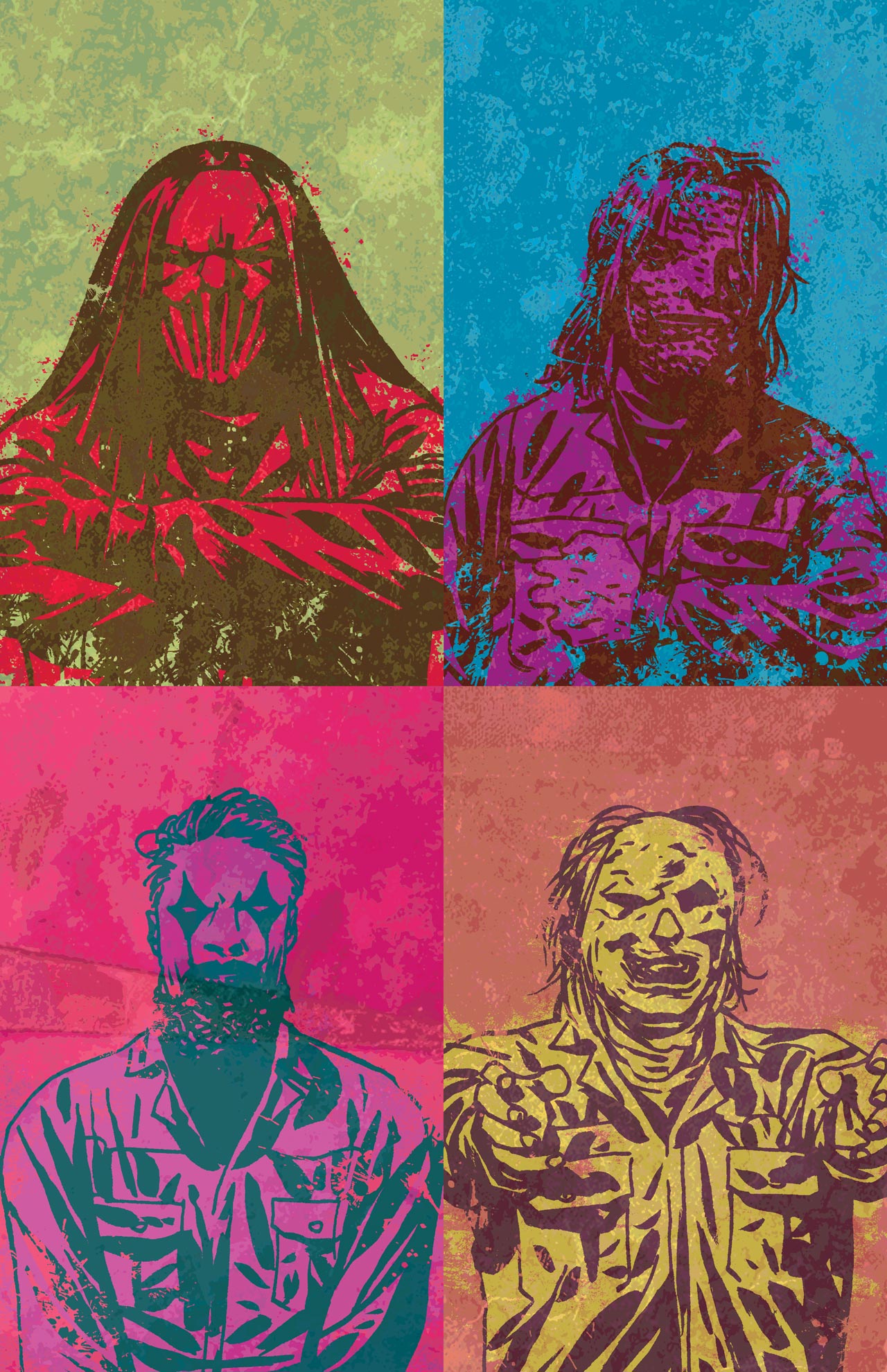
Corey: “You kinda get the best of both worlds. You’ve got your life but you’ve got this whole other thing outside of that…”
Charlie: “It’s great to go to the States, do the conventions and do it for a week, but then you get to leave it.”
Corey: “I’m the same way. That whole story, where it got picked up and then dropped, that’s just like Slipknot. We were going to be signed by Sony, before Roadrunner. They came and saw a showcase that we were doing and they fucking freaked out! There was a direct quote from the head of A&R, where he said, ‘If this is the future of music, I don’t want to be alive!’
So when we went platinum on the first album, we sent him a bunch of dead roses and basically said, ‘We’re the future of music and we want you dead.’ So it was brilliant. We had all our eggs in one basket and Ross Robinson had signed on to produce the record, and it just went off.
Roadrunner came back in, and they’d been watching this thing even before I joined the band, and they said, ‘We’ll take a chance on you… we’ll see what happens!’ and I don’t think they knew what was going to happen, and we certainly didn’t. But now, my home life is quiet. I live on a cul-de-sac, I have a lawn I have to mow and dishes to wash. We go on tour and everyone goes crazy, but then I can go home and it’s fantastic. I don’t need any of the bullshit, you know?”
Charlie: “Yeah, it’s true. Yesterday I was standing in the living room, doing the ironing… and I do remember thinking, ‘I’m the bloody artist for The Walking Dead, for crying out loud!’ Ha ha ha! But I still have to iron out those creases. Your family don’t ever see you like that. They just see you as the guy they’ve known for, in my case, 48 years. I can’t start saying, ‘Don’t you know you know who I am?!’”
Corey: “Yeah, you still have to scrub stains out of your clothes!”
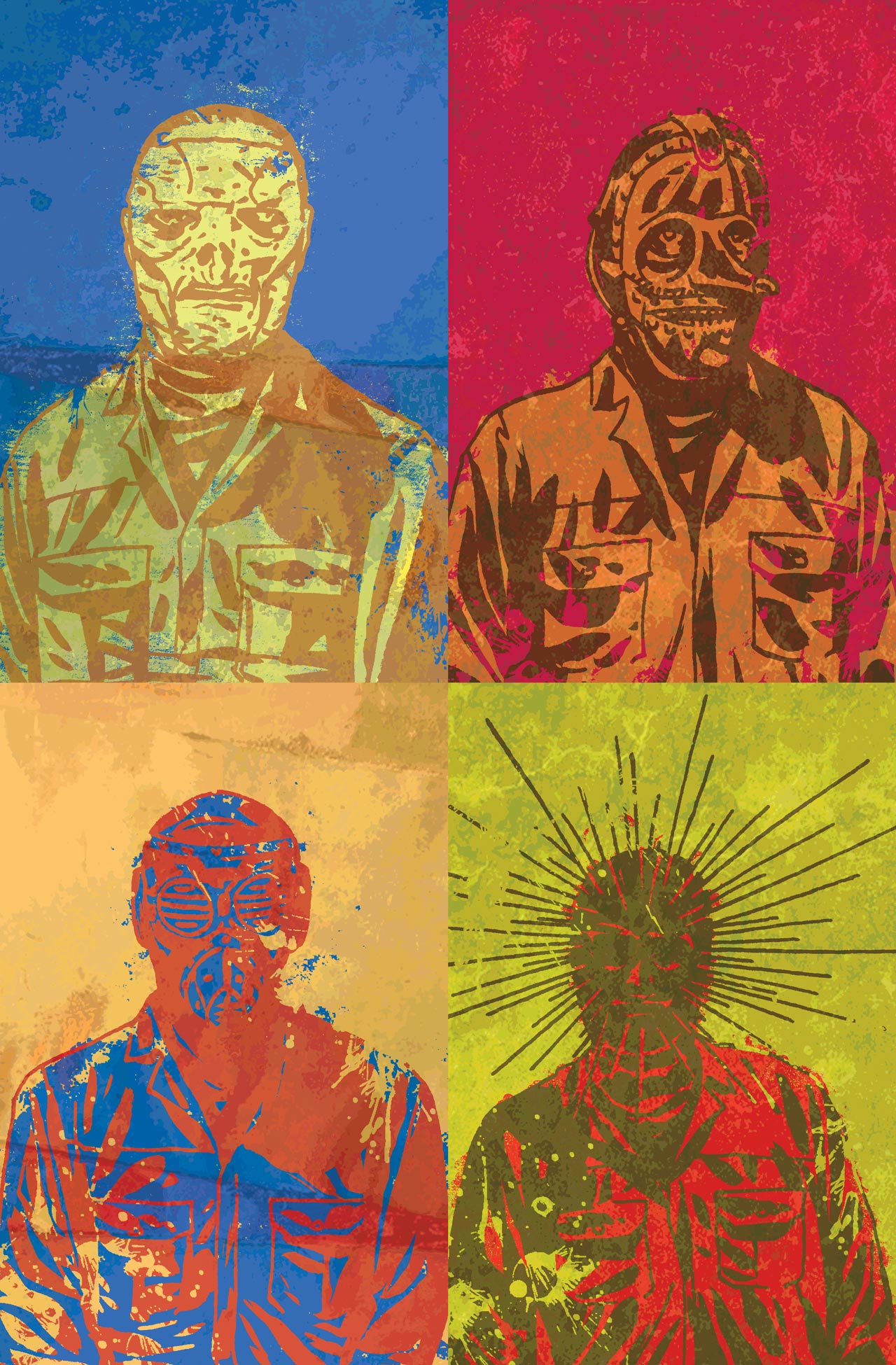
Charlie: “So you’re obviously still a massive comics fan… what do you read now?”
Corey: “It’s got to the point where I follow writers. I’m into Garth Ennis, Warren Ellis, Brian Bendis… anyone who ends with ‘is’, I guess. Ha ha ha!”
Charlie: “I know Garth quite well and he wrote one of my favourite comic books of the last 10 years, the Fury stuff…”
Corey: “Oh yeah, I loved that! It was so good. I went out of my way to get every copy of that. Preacher is my all-time favourite. It’s so good. When I tell people about comics, that’s the one… I always say The Walking Dead, Preacher and Transmetropolitan – those are my three. Walking Dead’s still going on, but the other two, I just tell people to go and get the trades… and just read the entire fucking story.”
Charlie: “It does help when something is finite. It’s quite daunting to start on something that’s going on for years…”
Corey: “I can’t tell you how many times I’ve bought Preacher. I’ve bought that entire story maybe five fucking times. I miss going to find a new issue, so if I don’t have it with me I’ll go and buy it again and fuckin’ cart it around Europe and read it all over again. That’s how much I love that story. Transmetropolitan is the same way. I bought all the trades for that, an entire set signed by Warren Ellis that I’ve then shrinkwrapped so no one can fuck with it!”
Charlie: “You’ve got it bad! Ha ha ha!”
Corey: “I’m a terrible fanboy! When I first went to Comic Con, Garth Ennis was doing a signing. VH1 was following me round to shoot this little vignette, and then I spotted Garth and I was like, ‘Holy fuck! I’ve got to get something signed!’ I freaked out like it was the fucking Beatles. I was being so fucking stupid. He must have been thinking, ‘Who’s this dick?’ Ha ha! But he was absolutely wonderful and I talk to him on email all the time now. There’s this weird fucking nucleus of comics, music, art… and it’s just everything that my 14-year-old self would be losing his fucking mind over, you know?”
Charlie: “It’s funny how music and comics go hand in hand, and everyone comes crawling out of the woodwork, all these musicians that are really into the whole thing.”
Corey: “Is it because of the fantasy side of it? Because I’d assume imagining how to illustrate a piece of a script – and I’ve written a comic so I know you want to be specific, but not too specific because you don’t want to limit what the image is – so I would compare that to coming up with a piece of music. But how is it for you?”
Charlie: “Well, I can see the connection because we’re sort of brothers in a strange niche. You don’t get many pop stars, mainstream people, coming out to Comic Con. It tends to be more the alternative guys and the heavy metal guys.”
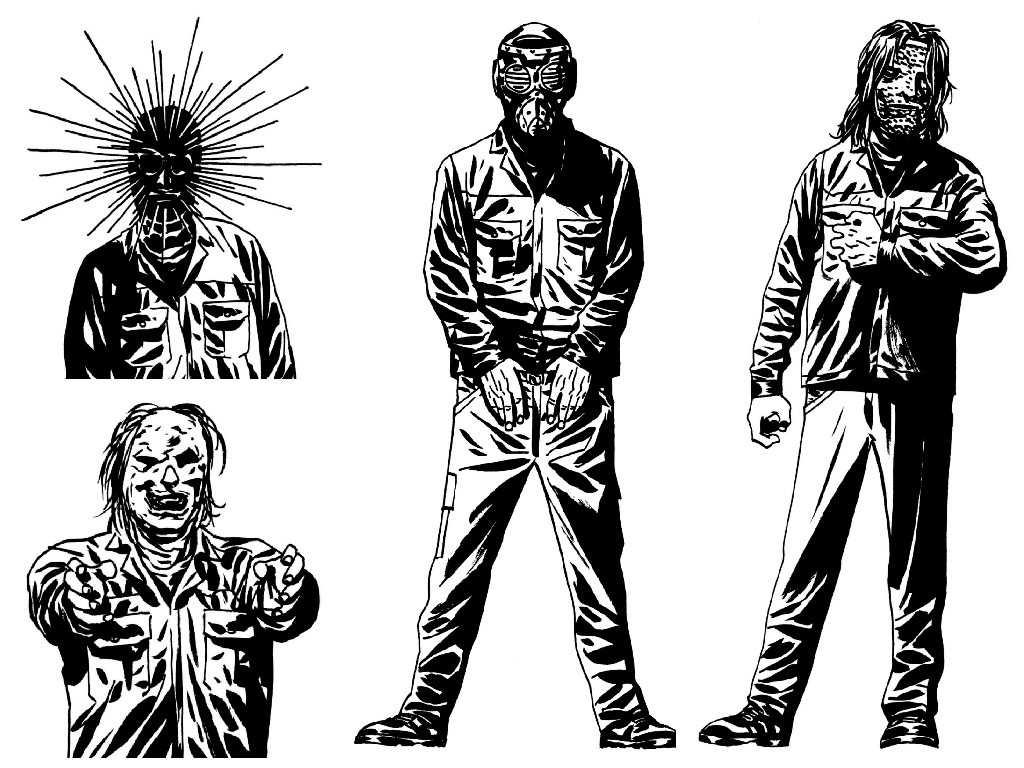
Corey: “Well, I’ve got to say that a lot of modern pop music doesn’t have a lot of fuckin’ imagination!”
Charlie: “It’s probably because as comic book artists we’re used to being always ridiculed as an artform, except in France where you’re hailed as an artistic god… they call it the ninth art, so thank you, France! I’m going to a convention over there and it’s bigger than San Diego Comic Con.”
Corey: “Wow, really?”
Charlie: “Oh yeah, but 90% of the comics are French comics. It’s not even international comics. It’s French comics and then 250,000 people descend on the event! But I think that if you and I feel a kinship, it’s because we’re always fighting against the mainstream and people dismissing what we do. I’ve been in the industry for over 20 years. The first 10 or 12 years were pre-Walking Dead, and people would find out I’m a comic book artist and say, ‘Oh, that’s interesting… what do you do?’ I would list a load of stuff, like, ‘I’ve done some Superman, The X-Files…’ but I always thought it’d be great to be able to say, ‘Well, I do this…’ and everyone knows what it’s about.
“Generally, unless you’re talking to an 80-year-old grandmother, everyone has heard of The Walking Dead – they’ve either watched it or they know vaguely what it is… You do get some kudos from the mainstream, although that’s not something I care about. I did The X-Files for two years and everything associated with The X-Files was really successful, so I was making money but creatively it was unfulfilling and people weren’t buying anything else I did. After The X-Files I was back to square one again, so I know about being up and down, and I’m a lot more appreciative of everything now than I would’ve been if it had just been huge success straight away.”
Corey: “I’d been doing music for 13 years before we even got a shot, so I’d had so much time in bar bands and doing three one-hour sets of covers every night. When Stone Sour started, which I was doing before Slipknot, we were doing the same thing but I was doing covers and originals, so it was like I knew instinctively that I wasn’t gonna play fuckin’ covers for the rest of my life… especially in Des Moines! But I moved around a lot, too. I tried to crack open different cities, like Chicago and Denver, but I just couldn’t find it, you know?
Slipknot was so fuckin’ 180 ̊ from anything I’d ever done, but I loved the band. I’d seen them playing and I knew all the guys from doing shows in different bands, so it was interesting when everything really started to take off. I’d done all this work playing to, like, seven people and the bartenders. It’s weird… it just makes you appreciate it more when it does start to happen.”
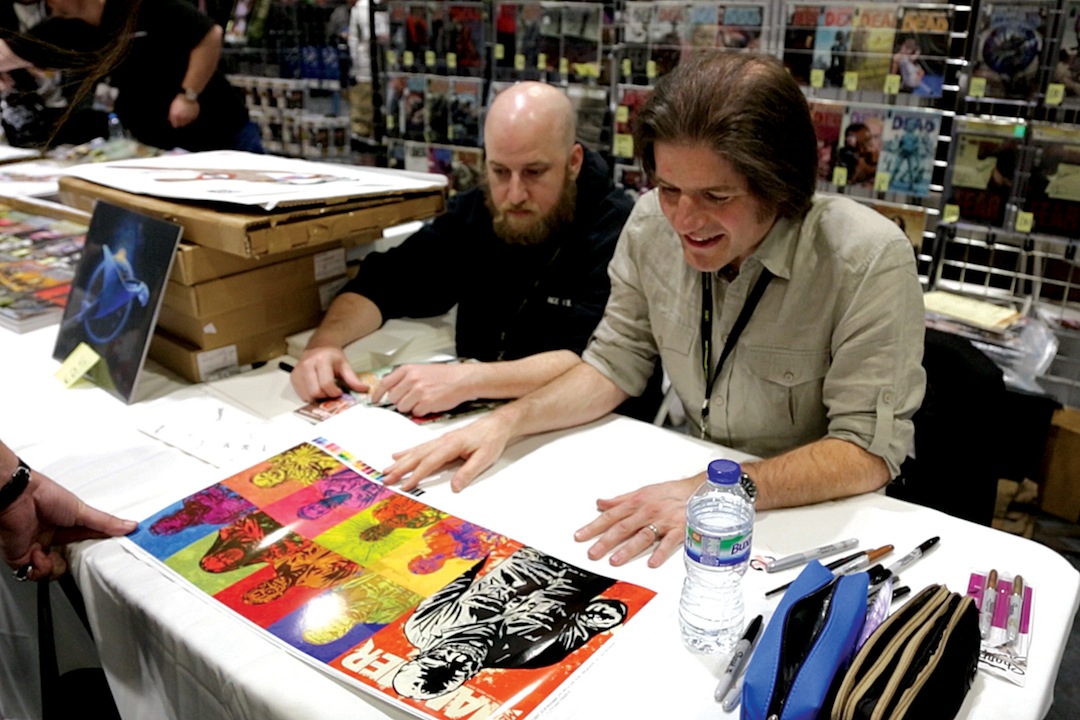
Unfortunately, time is running out and Corey has a Slipknot show to do. And so, while it is clear that they could chat about comics for the rest of time, we have to gently nudge these two inveterate geeks towards the small matter of designing Metal Hammer’s front cover.
Charlie: “What I’m always after, away from The Walking Dead, is to do something completely out of the box, so working with you guys is perfect for that.”
Corey: “What I love about the way you set a scene is that whatever is going on, there’s always an iconic look to it. I love the way you do that. So if you’ve got ideas, I totally trust you!”
Charlie: “Anything that takes us away from the obvious is really good. People are going to expect some blood-splattered thing…”
Corey: “That’s the thing with great art and great music – there’s depth and dimensions. By doing things a certain way, it could almost be a metaphorical representation of the bond between artwork and music. Hey, can we do a gatefold? We did that with our Avengers cover [Metal Hammer 245, July 2013]… maybe we could even fuck with it and turn it on its side and have some of the other bands that’ll be in the magazine on there too?”
Charlie: “To be honest, it would probably be better if it was just you guys. You have such a unique image. You don’t want the image to be overcrowded, and you’re a crowd on your own! Then I wouldn’t need to cram you all onto the front. I hate to say it, but are there members of the band that are more upfront and prominent than the others?”
Corey: “Oh yeah, absolutely.”
Charlie: “So the main guys can be on the front, and then you turn it over and the rest of the guys are there too, in some interesting environment… I think we can turn this into something pretty cool, but we’ll have to work out what’s possible with Metal Hammer. You’re the editor, right?”
Corey: “Damn right! I’m the fucking editor… and my way is law! Ha ha ha!”
Originally published in Metal Hammer 269
